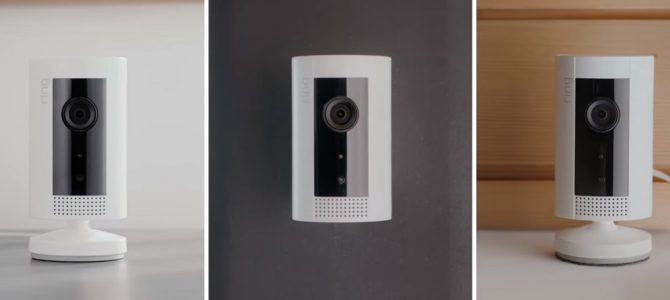
Looking for last-minute presents? Don’t buy Amazon’s Ring home camera system. Easily hackable, super creepy, and massively Orwellian, Ring and other home surveillance tech give you the illusion of protection while stealing your privacy and autonomy. Ring isn’t the only device to have been hacked. Nest, Alexa, and baby monitors are just a few of the home devices that have bad actors have hacked and manipulated.
A perv recently used a Ring camera to gain access to an eight-year-old girl’s bedroom. Her parents had installed the device to keep tabs on her. Through the camera, a truly disgusting man can be heard to say: “I’m your best friend, I’m Santa Claus.” The girl calls out for her mother, and the voice repeats: “I’m Santa Claus, don’t you wanna be my best friend?”
Each time I've watched this video it's given me chills.
A Desoto County mother shared this Ring video with me. Four days after the camera was installed in her daughters' room she says someone hacked the camera & began talking to her 8-year-old daughter.
More at 6 on #WMC5 pic.twitter.com/77xCekCnB0
— Jessica Holley (@Jessica_Holley) December 10, 2019
Another family had to endure a racist diatribe while standing in their kitchen looking up at their camera in confusion. It’s pretty disturbing to watch the voice make rude comments about their child’s skin color.
Their son doesn’t appear in the video, so for the self-identified Chance to know their family details, he would have had to be watching for more than just these few minutes, before the couple pulled the batteries from the camera.
Ring told the couple “the email address and password of one of your external accounts was exposed in a data breach.” But in a blog post by Ring, the company states,
Recently, we were made aware of an incident where malicious actors obtained some Ring users’ account credentials (e.g., username and password) from a separate, external, non-Ring service and reused them to log into some Ring accounts.
Unfortunately, when people reuse the same username and password on multiple services, it’s possible for bad actors to gain access to many accounts. Upon learning of the incident, we took appropriate actions to promptly block bad actors from known affected Ring accounts and affected users have been contacted. Out of an abundance of caution, we encourage Ring customers to change their passwords and enable two-factor authentication.
It’s all well and good to keep changing your password, have a different login in combo for every site and device, and make sure that each login meets site r3qu!r3Ment5, and is stored somewhere no one else knows about or can access, but it results in some massive password fatigue. It’s impossible to count how many times I’ve tried to log on to a website only to click “forgot password” and go through the ritual creation of new credentials before I can order my kid a new pair of kicks.
One solution is to let password generators create and store nearly unbreakable passwords. These you don’t have to write down anywhere. And it doesn’t matter if you forget them or never know them, because they are kept locked in a digital vault that’s only accessible with your face ID or fingerprint.
The downside is that this fix for keeping safe your family and privacy safe becomes the purview of a computer program. Plus then you have your faceprint and fingerprint stored in the cloud. With either solution, you’re trusting your tech to keep you protected. There is one other, super-obvious solution, which is to not have your home and family surveilled.
Why do we do this, anyway? Why do we install cameras in our homes so we can keep an eye on ourselves? It’s not just cameras. It’s all of the devices that are connected to the internet of things. From toasters, to coffee makers and refrigerators, to speakers, thermostats, and televisions, everything is taking a gander at our private spaces and preferences.
Tech companies store this data so they can make the tech better serve us, but not only do data breaches abound, but companies don’t even know what they’re doing with the data. Amazon’s Echo recorded an in-home conversation without being asked to and then sent that recording to a random contact. With these devices around, privacy is not private, it’s not even personal. It’s accessible to anyone who takes the time and energy to go after it.
When we install cameras in our homes, we think it gives us security and peace of mind. We look in on our kids, take stock of our space when we’re not there, and figure that since we have nothing to hide, it’s no big deal for other family members to watch us stir the marinara and scratch our butts. But when we surveil ourselves and our families, what are we doing to ourselves, to our own decision making process, and our ability to trust each other?
As a teen, I had a friend whose dad took away her bedroom door as a punishment. He felt she needed to be watched, and had lost the privilege of privacy. The idea that she had to exist in the public eye all the time was a horror to all her friends. Now we think it’s basic, and we think our kids view our ever-present eyes as a deterrent.
We fear what those kids might get up to if we weren’t watching! We’ve taken away our family’s privacy, and they haven’t done anything wrong. This is a false sense of security, because what it means is that we don’t actually trust each other to behave properly when no one is watching.
How much better it would be to instill in children and ourselves a cohesive decision-making process, so that we know how to make the right decisions, judge our actions, and have awareness of when we step out of bounds. We would have to hold our own selves accountable, not depend on someone else to call us out, and suffer the consequences of our bad actions, including the affliction of guilt that comes with screwing up.
If we and our kids can’t behave ourselves when someone else isn’t looking, we have a way bigger problem than surveillance by hackers. Instead, we should drop the cameras and slowly back away. Constant surveillance does not further our capability to exist, or protect us, it steals our ability to trust and to be trusted.
Whatever you do, don’t buy anyone home surveillance tech for Christmas. It may seem like a neat little tech gift, but it’s actually extremely creepy. You may buy it to keep an eye on your kids, dog, or cat, or to find out who is stealing those Amazon Prime packages from your front steps. But even if you think you are the watcher, you are the one being watched, and we’re not better off for it.









